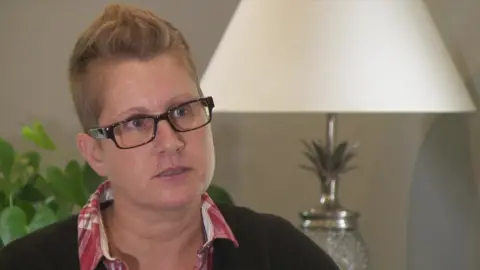Rape victims still face police phone trawl, says commissioner
 Getty Images
Getty ImagesProposals for England and Wales mean people who claim to have been raped will still face pressure to hand over their phones to police and prosecutors, says the victims' commissioner.
The government's apology to rape victims has been "undermined" by the move, Dame Vera Baird told the BBC.
The Police, Crime, Sentencing and Courts Bill sets limits to police access to victims' phone data.
But these safeguards should be stronger, argues Dame Vera.
The Home Office says there will be a code of practice alongside the new law to protect the privacy of victims and witnesses.
Last month, Justice Secretary Robert Buckland apologised to rape victims for low conviction rates in England and Wales and promised "to do a lot better".
But Dame Vera warns that while the proposed legislation requires police to get the agreement of potential rape victims to hand over their phones or other personal data such as medical records, it does not define exactly what "agreement" means.
Nor does it set limits on what information can be downloaded from phones, nor how it might be used.
"It is definitely a backward step," says Dame Vera, "and it definitely clashes with the apology from ministers and with the intention in the rape review to focus on the defendant and less on the complainant."
Victims of sexual crimes are often put under pressure by police and prosecutors to hand over their phones because of the possibility they might have sent private messages which undermine their evidence.
This is voluntary, but victims are often told the case will be closed if they do not comply, and some withdraw because they are uncomfortable handing over private data.
Sarah's story
Sarah Jenkin has taken the rare step of waiving her legal right to anonymity because of her anger at the way she was treated after alleging she had been raped.
She had been drinking heavily and was unable to give a detailed account of what had happened. The man whom she accused denied rape.
Sarah said the police had not initially wanted to access her phone but later said it was necessary.
"I got the impression that it had been requested that the police get that information. Requested by, I assume, the CPS...

"I feel very angry about what has happened, the trauma that I've suffered directly from the treatment of particular aspects of the criminal justice system is unbelievable."
Sarah said the CPS claimed there were inconsistencies in her messages to friends.
"They seemed, certainly in my case, to be using this information as a way to try to discredit me, discredit my account, imply that I'm not a credible witness."
However, she said, her personal messages would have also made it clear she was gay, and had no history with men, suggesting it was unlikely she would have consented to sex.
"This was something that I raised with the CPS only to be told that my sexuality wasn't relevant, which was very hurtful," she told the BBC.
The case was dropped by the CPS after prosecutors said they would offer no evidence. The man she accused was acquitted.
Even a tighter law, to protect victims of crime, would only go so far in restoring her trust in the justice system, she said.
A Crown Prosecution Service spokesperson said the case was stopped after a "careful review" because it did not meet the legal test required for a prosecution.
"Every rape case that comes to the CPS is dealt with by a specialist prosecutor in a dedicated rape and sexual offences unit.
"Each one is decided on its own merits and whenever the legal test is met, we will not hesitate to prosecute."
'Digital strip-search'
Police forces have already ditched a process for obtaining large amounts of phone data, described by campaigners as a "digital strip-search".
But recent research for the government's review of rape cases, suggested it was often prosecutors, rather than police officers, who pushed for victims' data, to enable "robust" charging decisions.
In a statement, the Home Office said the new law would "outline the general duties" of police and prosecutors but there would also be a code of practice on how the powers should be used, to protect the privacy of victims and witnesses.
Work is underway to ensure the criminal justice system only takes information from victims "where it is necessary for the investigation and not as a matter of course," said an official.
Dame Vera says that, behind the scenes, senior police officers support her attempts to protect victims.
The Crown Prosecution Service has, in the past, been accused of investigating the person reporting a rape or sexual assault, rather than the suspect, and of trying to prevent cases going to court if they are less likely to result in a conviction.
This was one of the reasons why the government, through Mr Buckland, apologised to rape victims.
The government's rape review concluded: "These are trends of which we are deeply ashamed."
"Victims of rape are being failed."
